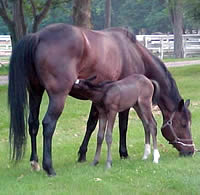When Deborah Borra showed up at Cornell University in 1994 to learn about the breeding business, equine reproduction specialist Dr. Chris Schweizer and Dr. Michelle Kutzler didn’t expect (as they confessed to her later) that she’d last a year in her new venture.

Deborah, a successful real-estate agent and a professional harpist, had recently acquired Brando, an 18-year-old Swedish Warmblood stallion, and three broodmares. She was a long-time rider but had never owned a stallion or bred a mare.
The years have proved the veterinarians (whom Deborah now numbers among her best friends) wrong: Her Normandy Manor Farm has grown from nine horses on three Long Island acres to 30 horses on a 230-acre farm in western New York state. Brando succumbed to heart failure at 24, but the farm now stands Swedish stallions Kardinal and Falcon.
Deborah’s success comes from her seemingly inexhaustible energy and enthusiasm and her systematic approach to the business end of breeding. She has educated herself (and continues to) in the veterinary and technical side of equine reproduction through courses at Cornell and with frozen-semen specialist Paul Loomis at Maryland’s Hilltop Farm. And she runs her farm efficiently using knowledge acquired in her earlier business career.
Deborah’s learning curve started with artificial insemination, a topic that quickly got more complicated when she took Brando to Cornell to be collected. “We found his motility was low. These are the things I needed to learn: To increase his chances of settling his mares, I had to know about motility and concentration [the number of viable sperm in a given volume of semen] from the bottom up.”
Her Normandy Manor lab consists of a microscope, hemocytometer (for counting sperm), centrifuge (for spinning down and concentrating semen), refrigerator and incubator (for warming semen extender to the correct temperature)–“very basic,” she says. Although disposable shipping containers (which don’t require a return deposit) are now available for transported semen, she prefers to assure her product’s quality by using the more substantial Equitainer for all but local shipments.
Other important skills she needed to learn involve safe stallion-handling technique for collection. “It takes a three-person team to collect a stallion, and you need to know what you’re doing. We wear hard hats”–a protective measure she adopted from standard practice at Cornell–“because you can easily get whacked by a hoof.”
As for the details of setting up and running her farm, good business practices prevail. They include:
- A realistic business plan. “I had to sit down and figure out what I’d be investing in the project. How much grain and hay will I need in a year, what will the insurance bill be, what’s my help going to cost? I looked at a lot of farms before I found a piece of property that could do more than one thing in case this project didn’t go the way I thought it would. This is a great horse farm, but it could also be a golf course, a conference center, a spa, a bed-and-breakfast, or a group of smaller farms. And I had enough savings to keep me going during the startup.”
- Consistent organization. “Everything (tools and supplies) in each of our eight barns is hung or stored in the same place. That makes it easier for both the help and for veterinarians on a farm call, and everyone knows where to find what they need in an emergency. My repro veterinarian, Jeff Jamison, says it’s a pleasure to work at this farm because the lab is so well organized that he always knows where to find what he’s looking for. For feeding, I don’t find measurement by the ‘scoop’ accurate enough unless the same person feeds all the time. I buy paint buckets of specific sizes and label them with each horse’s name.” Feed containing medication always goes in a yellow bucket to avoid its being fed to the wrong horse.
- Good help that stays around. “Getting good help is the most difficult part of the business. I can offer on-site housing–a big plus–and I pay a decent salary. I need the kind of person who wants to learn as much as possible and says, ‘Wake me up for the foaling, even if it’s in the middle of the night.’ Teaching new employees is time- and labor-intensive, so I use what I learned in the real-estate business about motivating people to stay and work harder for you. My accomplishments as an agent were rewarded with trips to Barbados and Hawaii. When my employees have been working hard (during foaling season, for instance), I send them out for massages or give them an extra day off or certificates for a restaurant dinner.”
- Regular follow-up. “Often, I work alongside the help around the farm and watch them, just to be sure they’re following the program. I also look at every horse daily.
- Honesty. “The horse business is a tough one, and you better be honest or you won’t have a good reputation. As a breeder, you can’t succeed if you’re just focused on getting the stud fee. I like to look at people’s mares and hear what they hope to achieve before I agree to a breeding. A couple of times (for instance, when a mare owner hoped to breed a driving horse), I’ve said, ‘This is not the stallion for you,’ and referred owners to a stallion on another farm.
“Breeding can be an expensive proposition. When we sell a breeding, mare owners need enough information to give them the best chance of success,” Deborah says. “Cooled transported semen should come with a form (as ours does) telling the mare owner the motility and concentration of the sperm and how many motile sperm the shipment contains. If you contact a stallion owner who doesn’t want to answer questions about these details ahead of time, don’t go any further.
“The honest principle also applies when I sell a horse. I owe it to the animal to be up-front about its problems as well as its strengths, so that the new owner can give it the best possible care.”
So how is Deborah’s business working out, ten years after her first appearance at Cornell? “I’ve been concentrating mostly on breeding my own mares, and I have some young horses for sale now. We’re right on track, where I think we should be.”
Her broodmare band includes several “diploma mares (the highest rating conferred by the Swedish Warmblood registry) imported from Sweden. Still learning, she’s been working with reproductive specialist Dr. Dietrich Volkmann at Cornell on simple semen-freezing techniques and plans to freeze Normany Manor stallions’ semen right at the farm in the near future.
The hands-on work of any horse business is hard and unrelenting, but Deborah still sounds enthusiastic about sleeping in the barn (on a mattress in her SUV) during foaling season, as she’s done in past years after lightning knocked out the farm’s closed-circuit TV system. And she’s still proud of having learned enough to be able to cope successfully with a problem birth–a badly presented foal, or dystocia. “If I hadn’t spent all that time at Cornell, I
would have lost the mare and foal.”
This article first appeared in the January 2003 issue of Practical Horseman magazine. For detailed tips from Deborah Borra on how to prepare for the birth of a foal, see her story “Get Ready for Baby” in the January 2005 issue of Practical Horseman.









